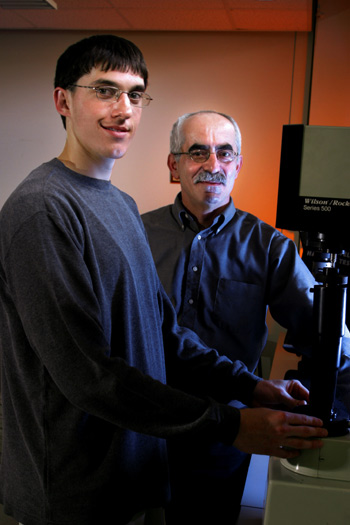Marquis Scholar Brian Root ’04 (Benton, Pa.) presented advanced research on metals at a national conference that he conducted through a prestigious program sponsored by the National Science Foundation.
The research project and presentation provided valuable experience for the chemical engineering major, who will attend graduate school at Northwestern University this fall, working toward a doctorate in materials science and engineering.
Root presented his findings at the 18th annual National Conference on Undergraduate Research. Hosted April 15-17 by Indiana University-Purdue University at Indianapolis, the conference showcases the work of nearly 2,000 undergraduate students. Forty-two Lafayette students were accepted to present their work at the conference.
Root was among ten students in the nation chosen to participate in a Research Experience for Undergraduates program sponsored by the National Science Foundation and hosted by the University of Central Florida. He studied novel materials such as shape-memory alloys and ceramics reinforced with carbon nanotubes. Shape-memory alloys are elastic-type metals that can be severely deformed and then returned to their original shape by heating them. A carbon nanotube is a tiny structure with electronic and mechanical properties that enable it to strengthen polymer structures.
Root’s presentation discussed nanoindentation, also called depth sensing, or instrumented indentation. Nanoindentation is used to extract information from a material, probe its characteristics, and determine its mechanical properties.
“The technique is useful to get mechanical properties at reduced length scales,” says Raj Vaidyanathan ’94, assistant professor of mechanical, materials and aerospace engineering at the University of Central Florida, and Root’s adviser for the REU project.
The main idea of the project, Root says, was to determine how changes in composition affect its properties.
Root found that an increase in iron content increases strength and indicates a lowering of the phase transformation temperature; the addition of carbon nanotubes causes the yield strength, or the strength needed to change the object’s shape, to increase from five to 10%. Root learned that nanoindentation could be used to find quantitative and qualitative information about materials.
Working with a Lafayette alumnus in an environment other than Lafayette was not difficult, he says.
“I did not know [Vaidyanathan] was a Lafayette alum when I applied to the REU program at Central Florida,” Root says. “Dr. Raj paired me with himself since my interests matched his research.”
He says that Vaidyanathan was patient, and he explained information in a clear and thorough manner.
“He obviously has a great deal of experience and knowledge in the area, which helps me to understand what is going on in the materials systems,” says Root. “His ability to break down the project into sections helped a great deal in developing the paper, and especially the presentation.”
Root has been a member of the student chapters of Engineers Without Borders and the American Institute of Chemical Engineers as well as Soccer Club, and has competed in intramural sports. He traveled last year for an interim session course, Exploring South America: Brazil, the River Plate, and the Andes. Previously, he participated in Lafayette’s EXCEL Scholars program, working with Mehmet Uz, professor of chemical engineering, to develop electrically insulating coatings for possible use in the nuclear energy industry.
In EXCEL, students assist faculty with research while earning a stipend. EXCEL has helped to make Lafayette a national leader in undergraduate research. Many of the more than 160 students who participate each year share their research through articles in academic journals and/or conference presentations.
Lafayette is a small school with a large number of opportunities to conduct research, according to Vaidyanathan. The level of interaction between professor and student is a positive aspect of the educational experience and the academic environment encourages students to do research, he says.
“I’m a product of that system,” he says. “Lafayette has an exceptionally strong program.”
“It was nice to be able to influence another Lafayette student,” adds Vaidyanathan, who credits Director of Engineering Jim Schaffer with influencing him to attend graduate school at Stanford and MIT after graduating from Lafayette in 1994.
Vaidyanathan says he was impressed with the work by Root, whom he found to be a motivated student with strong research and communication skills — an excellent combination for a potential graduate student. Before the REU program started, however, Root was wary about continuing his education in graduate school. “After spending the summer in Florida, he was fairly certain that he would go to graduate school,” says Vaidyanathan.
Root says that the chemical engineering major is “very difficult” at Lafayette, but he has found the professors “very supportive and helpful. Lafayette has one of the top programs in chemical engineering for colleges without a graduate program, so it is a very good place for this major.”
Root’s brother, Matthew, also is a graduate of Benton Area High School and a Marquis Scholar and chemical engineering major at Lafayette. Matthew Root has conducted EXCEL Scholars research on metal corrosion with Ricardo Bogaert-Alvarez, assistant professor of chemical engineering.
As a national leader in undergraduate research, Lafayette sends one of the largest contingents to the National Conference on Undergraduate Research each year.
Chosen from among Lafayette’s most promising applicants, Marquis Scholars receive special financial aid and distinctive educational experience and benefits, including a three-week, Lafayette-funded study-abroad course during January’s interim session between regular semesters. Marquis Scholars also participate in cultural activities in major cities and on campus, and mentoring programs with Lafayette faculty.

Marquis Scholar Brian Root ’04 developed insulating coatings for possible use in the nuclear energy industry as an EXCEL Scholar with Mehmet Uz, professor of chemical engineering.
